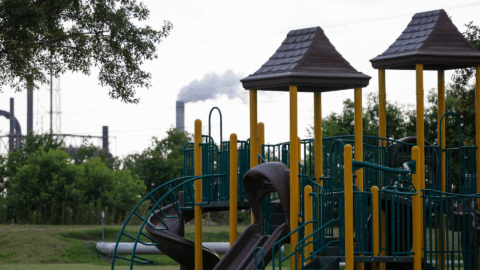The Flint Water Crisis Is Not Over and Congress Must Not Leave Them Behind
More than two years since a public health disaster hit Flint Michigan, Congress has yet to provide needed assistance. Some on both sides of the aisle are working to advance help for Flint, but the path forward remains unclear, with little time to spare on Congress’ legislative calendar. Congress must not leave town without taking action to help Flint.
EDF recently joined partners in the environmental community to help support a delegation of community leaders from Flint who came to Washington to lobby for overdue federal aid. Our friends at National Wildlife Federation, along with Sierra Club and many others, helped coordinate an effort to bring these Flint voices to Washington. The stories from Flint have been well-documented in the press, but to hear them in person is another thing altogether. I am hopeful it had as much of an impact on Capitol Hill as it did those of us who joined their meetings.

It was clear to anyone who talked with them that the problem isn’t over, not by a long-shot. At a most basic level, life simply can’t return to normal any more than it does when the weather calms after a tornado.
We should not expect a water system to take the type of shock it took in Flint and expect it to start working again with the flip of a switch. Erratic use makes it that much harder to resume protective corrosion control and or tackle related systematic problems like the Legionnaires‘ disease seen in Flint.
So, Flint residents are reminded of the problem all day, every day. How do you eat fresh food if you can’t wash it, or have to use bottled water to do so? When you go to the supermarket, can you trust the sprayers that keep the vegetables moist? One woman told of putting on weight because she eats pizza all the time now, instead of fresh food. Because lead has accumulated in many water heaters, you can only shower with cold water. You can’t take a bath, you can only shower.
Then there are the practicalities: where do you put the bottles of water? If you’re elderly and take the bus, how can you carry the heavy bottled water? All the Flint residents had photos on their phones of the stacks of bottled water in their homes. And they all had opinions on what kind of water they liked for what purpose. They know bottled water that well.
Those are daily challenges, but they’re small compared to what the Flint community must face in terms of the human cost of the water crisis. Lead is especially dangerous to the developing brain in children and the effects are serious and permanent. Flint families, schools and the children themselves will face challenges for years to come thanks to tainted tap water they were told was safe.
The Michigan Congressional delegation has been working on a federal aid package to give the community a hand out of the trench. The aid package was passed with broad bi-partisan support in the Senate as part of a water infrastructure measure, thanks to the work of the Michigan delegation and the leadership of Senators Jim Inhofe and Barbara Boxer. Yet, the path through the House remains unclear.
Meanwhile, an aid package for flood victims in Louisiana, which should also be a priority, could also be in peril. Congress should act swiftly to help the affected communities. But help for Flint should move too. It will take years of work for the people of Flint to get a water system back to normal, to replace lead services lines, and to help the children affected by lead poisoning. It’s time Congress lends them a hand.












